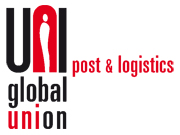Global unions press for global dialogue at DHL meeting

Global union federations the ITF (International Transport Workers’ Federation) and UNI Global Union jointly press logistics giant DHL to work with trade unions to maximise performance at the company’s shareholder conference in Frankfurt today (Tuesday).
The two organisations believe that if DHL honours its stated commitment to respecting rights by working to achieve uniform standards and conditions for its workers worldwide, it will be able to enter a new era of cooperation that will benefit DHL, workers and shareholders alike.
Neil Anderson, head of UNI Post & Logistics commented: “DHL has had a history of cooperation with the ver.di union in Germany and we want them to commit to cooperation with unions at all of their other sites worldwide. We are asking them to take a cooperative approach to employee relations, which we believe will lead to better jobs for thousands of workers around the world and better service for their customers. DHL employees want to do their part to ensure a strong future for the company but DHL must recognise that its responsibilities are not just to shareholders and customers but also to its workforce of more than 500,000 people.”
The two global union federations have bought DHL shares in order to be able to address DHL management and investors who will be considering the company’s business plan and corporate social responsibility commitments. ITF Regional and Industrial Coordinator Ingo Marowsky will speak. He will say (in German, the language of the meeting):
“My name is Ingo Marowsky, I speak on behalf of UNI and the ITF, and between the two of us we represent a vast majority of your employees worldwide. We are also the ones who have distributed leaflets outside the hall.*
I will ask you questions about your Annual Report and offer you ways to increase your profits for 2009 and 2010 and beyond.
The first question is in regard to the operation in the USA. I would like to know how much of this damage can be attributed to the avoidance strategy against US unions, how much was due to the money and management time spent on employing union-busting firms, and how much was caused because of the tactics used to delay a contract with both the pilots’ union and the Teamsters union. Employee productivity increases through better labour relations. Avoiding unions costs short term money and creates long term damage to the reputation. This money can be saved. With us. Let’s talk.
My next question is about Strategy 2015, where you drop the seven earlier values and focus on just two: respect and results.
First, about results; concretely about the intended saving of 1 billion euros. In 2008, your report said that the contributions made by employees to savings - which I assume is through productivity increases and process optimising - was almost 300 million euros. This equals almost one third - one third - of those overall savings! Here is my question: our people are specialists in the workplace, we know best where to save even more money, and these savings could be higher if we were more involved, worldwide. Do you want this money, or do you want to waste this opportunity? Let’s talk.
Next I have a question about respect. You are a signatory to the UN's Global Compact, yet nowhere in your report do you report about ILO core standards and how you abide by them worldwide. In the same area, you refer to the Global Reporting Initiative. This initiative has certain reporting criteria, including reporting about respecting core labour standards. You also don’t report those. The question is why don’t you?
I am not saying that you don’t report because you have something to hide. I wouldn’t do that. But there is a way to truly monitor that - together - and this is via a global agreement.
An agreement which is built on respect. Respect for the standards you yourself subscribe to, respect for global standards, respect for the voice of the workforce. and respect for the fact that there actually is a global representation of that workforce: your workforce. Let’s talk.
Which brings me to the last question. For the best possible results, you need satisfied customers. To achieve this, you need motivated workers. One of the things we need for this is to cultivate open dialogue between the parties, which you propose in your report. My question is, that as you are aware of the offer from the international bodies which represent your workers, when do you to intend to enter into exactly that open dialogue. This would not be limited just to the cost cutting programme but would stretch worldwide.
We need a global agreement for a global company. We offer exactly this, for the betterment of the company, its shareholders, and its workers. This is the era of re-thinking the way capitalism works. Whether the American, British or German models are chosen the formula of a socially regulated market economy will prevail.
This company can be at the forefront of coming out of this recession as a true winner.”

